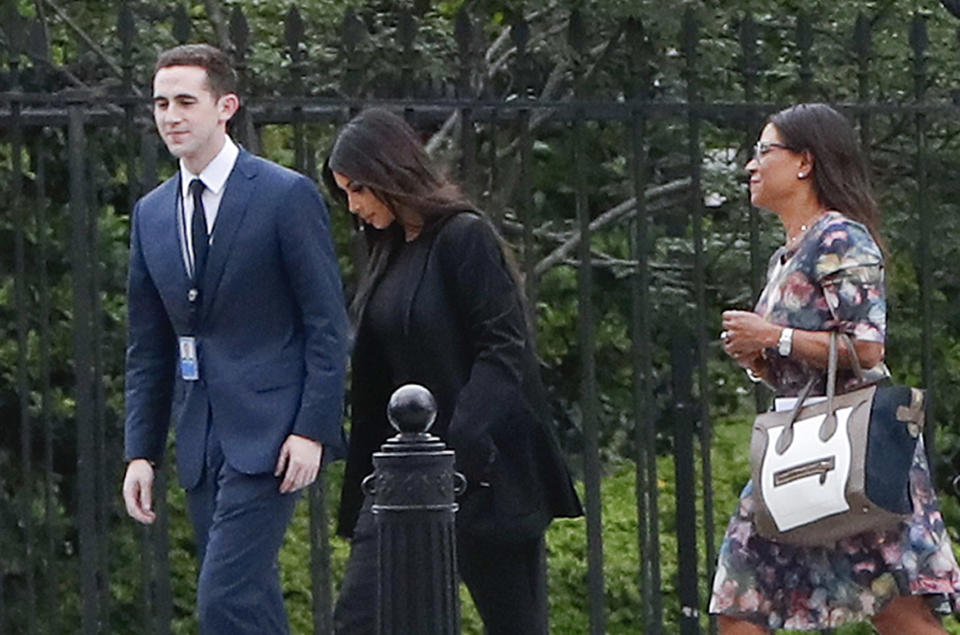Kim Kardashian’s next pardon efforts could be in behalf of these 5 worthy inmates

No one commands the internet quite like Kim Kardashian. Whether she’s rocking a skin-tight gold dress, hawking diet lollipops, or sexualizing motherhood, she tends to captivate the audience.
So it’s no surprise that Twitter erupted in the wake of her meeting with President Trump this week, with people offering analysis on everything from their iconic Oval Office picture to the “sexist” newspaper coverage that resulted. But there’s something different about this story — and it’s not just the lack of lollipops.

Unlike many of her publicity-seeking, body-focused moves, this one appears to be driven by the desire to raise awareness about injustice in America — in this case, individuals serving life sentences for nonviolent crimes. In her meeting with Trump, and in the months leading up to it on social media, Kardashian has highlighted one specific prisoner named Alice Marie Johnson.
I would like to thank President Trump for his time this afternoon. It is our hope that the President will grant clemency to Ms. Alice Marie Johnson who is serving a life sentence for a first-time, non-violent drug offense.
— Kim Kardashian West (@KimKardashian) May 31, 2018
A great-grandmother serving life without parole, Johnson’s crime was acting as a go-between for members of a cocaine drug ring in the mid 1990s. A first-time offender and single mother of five children, she described her situation to Mic in 2013 as like “being on death row.” After serving over two decades, she’s inarguably a candidate worthy of Kardashian’s campaign.
But as Kardashian herself noted in tweets after her meeting with Trump, Johnson is far from the only individual sentenced to die behind bars for a nonviolent crime. In 2011, the American Civil Liberties Union released an exhaustive report on the phenomenon titled A Living Death: Life Without Parole for Nonviolent Offenses.
We are optimistic about Ms. Johnson’s future and hopeful that she —and so many like her—will get a second chance at life.
— Kim Kardashian West (@KimKardashian) May 31, 2018
The findings were stark. At the time of the report, there were 3,278 people serving life sentences for nonviolent offenses in the United States — a number that has quadrupled in the past 20 years. The problem is one that disproportionately affects low-income communities and people of color, with the ACLU reporting that 65 percent of inmates serving life sentences for nonviolent crimes are black.
So as Kardashian continues the push for the release of Johnson, here are five more individuals serving life sentences without parole, for either nonviolent crimes or minor crimes, who could use her help too.
Timothy Jackson (Louisiana)
In perhaps one of the most egregious cases of mandatory minimum sentencing on record, Jackson is serving a life sentence without parole for attempting to steal a $159 jacket from a department store in New Orleans in 1996. His sentence is the result of the three-strikes law in his home state, meaning that prior stealing convictions on his record forced a judge to send him away for life. In an interview with local news, he expressed his disbelief at the sentence. “I’m locked up like I killed someone,” he said. “A $159 jacket. If somebody had told me I could get life for that, I wouldn’t believe them.”
Michelle West (California)
Listed as No. 2 on the Can-Do list of Women Deserving Clemency (behind Alice Marie Johnson), West was given two life sentences plus 50 years after her boyfriend implicated her in a murder she insists she had no involvement in (he received full clemency for testifying against her). In a petition on Change.org, her daughter — now 26 — pleads for her mother’s release. “My mom is a first time offender, serving a life sentence based on the word of a murderer who got full immunity for his ‘cooperation,'” her daughter writes. “There is no evidence that my mother ever harmed anyone.”
Elisa Castillo (Texas)
A first-time offender and grandmother who came to the U.S. from Mexico at age 13, Castillo told the ACLU she never “saw or touched the drugs that sent her to prison for the rest of her life.” She was arrested in 2008 after police uncovered drugs in secret compartments of buses she’d been driving as a part of a tour from Houston to Mexico. Castillo, who was sentenced to life in prison in 2009, says she was unknowingly “used as a pawn.”
Eva Palma Atencio (California)
Another first-time offender, Atencio was arrested in New Mexico alongside her husband for conspiracy to distribute cocaine and marijuana — and both were sentenced to life without parole. A mother of three young kids at the time, Atencio has now served 13 years for her crimes, with no end in sight. In a Change.org petition started by her daughter, she writes that the reason for the harsh sentence was her parents’ refusal to turn in other drug dealers. “My parents understand they did wrong. And they were more than willing to plead guilty to a charge of selling drugs,” their daughter, who was just 5 at the time, wrote. “But because my parents did not want to cooperate with the Government and become informants they were forced to go to trial and received Life Without Parole.”
Landon Thompson (Louisiana)
Thompson is currently serving a life sentence without parole for selling “a few grams” of crack cocaine — according to the ACLU — which he was doing to maintain his own addiction. His case, like many others involving minimum sentencing requirements, is one in which even the judge found the sentence ridiculous. “I think a life sentence for what you have done in this case is ridiculous. It is a travesty,” the judge said upon sentencing, according to court records. “I don’t have any discretion about it. I don’t agree with it, either. And I want the world and the record to be clear on that. This is just silly. But as I say, I don’t have any choice.”
Read more from Yahoo Lifestyle:
Kayne West says having bipolar disorder makes him a ‘superhero’
Kim Kardashian visits the White House to plead in behalf of Alice Marie Johnson
Follow us on Instagram, Facebook, and Twitter for nonstop inspiration delivered fresh to your feed, every day.

